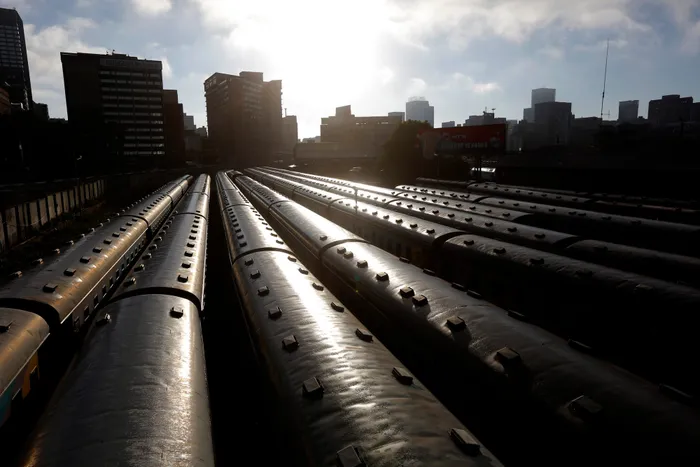Transnet recovery steams over resigned chiefs

The SA Transport and Allied Workers Union said it welcomed the resignations as they came at a crucial time at Transnet as the entity was faced with serious challenges. File picture
THE RAIL industry is looking to go full steam ahead with reforms steered by the National Logistics Crisis Committee (NLCC) and the implementation of the National Rail Policy (NRP) to course Transnet through its dark channels amid the resignation of top executives.
Transnet over the weekend reshuffled its executive with the appointment of Michelle Phillips, chief executive of Transnet Pipelines, as acting group CEO and Hlengiwe Makhathini as acting group chief financial officer to replace Portia Derby and Nonkululeko Dlamini respectively.
This comes barely a month after Public Enterprises Minister Pravin Gordhan asserted that Transnet would be tabling a turnaround strategy amid the industry's call for the resignation of the executive team by The Chambers of Commerce and the Minerals Council of South Africa.
The head of communications at the Minerals Council, Alan Seccombe, said they were encouraged by the work done within the NLCC and the platform that is being constructed for the recovery of South Africa’s rail, road and port logistics.
He said it was essential that the private sector be allowed to participate in the country’s rail infrastructure and its ports to optimise the movement of freight, exports and imports.
“The Minerals Council will continue its engagement with the Transnet board and the new group CEO, once that appointment is made, in the same spirit of co-operation and collaboration. The work is prioritised.
“We need to purposefully engage on the NRP with the National Logistics Crisis Committee and expedite rail reform – and private sector participation with its huge investment is key to rail reform in South Africa and for the economy,” Seccombe said.
Mesela Kope-Nhlapo, CEO of the African Rail Industry Association (Aria), said some crucial things should happen immediately: honesty and transparency on the true state of the national track infrastructure and about what investment is needed to repair it, engagement with the NLCC in good faith, and meaningful and lasting reforms to address the collapsing rail infrastructure.
Also, the Interim Rail Economic Regulatory Capacity, as set out in the NRP, should be made responsible for overseeing negotiations between Transnet and the private operators.
Aria called for the return of staff with strong rail freight operations capability, and there should be a renewed focus on grass-roots operational efficiency.
The organisation called for the re-installation of the MultiRail network operating system (or a similar alternative) and the installation of fleet-wide tracking systems to remove the opportunity for ghost trains and the fraudulent manipulation of trains.
It called for the recruitment of a replacement CEO who would be able to transition Transnet from a closed monopoly to a reconfigured open and transformed organisation in line with National Rail Policy and the broader economic needs of the South African economy.
“Aria believes the biggest challenge facing Transnet Freight Rail is the collapsing physical track and signalling infrastructure, and we have been highlighting for 12 months the fundamental underinvestment in maintenance,” Kope-Nhlapho said.
The South African Transport and Allied Workers Union (Satawu) said it welcomed the resignations as they came at a crucial time at Transnet as the entity was faced with serious challenges.
“It is a well-known that Transnet is on its knees. Satawu has previously emphasised that Ms Portia (Derby) cannot be the only person to blame for these challenges. There is a board and management that needs to be accountable as well.
“We strongly believe that if these problems are not addressed then Transnet will perish. Yes, the CEO and the CFO have resigned, but the problem will remain behind,” Satawu general secretary Jack Mazibuko said.
The United National Transport Union (Untu) said it was expected that Derby would resign due to mounting pressure from business lobby groups and the industry as a whole.
Untu said it supported anyone in charge of Transnet, as long as they did not have a fraudulent and corrupt past and possessed the necessary skills and expertise to turn the entity around.
“It is crucial that the person appointed to these positions has the appropriate tools and support from the shareholders to perform their duties effectively, especially given the financial distress that Transnet finds itself in, the current lack of operational locomotives and the other issues that have to be dealt with.”
Aria said Transnet’s deteriorating performance, highlighted by the release of their 2023 financials in September, pointed to an organisation under deep duress, and the urgent need for private-sector investment to arrest the decline was evident.
“Transnet reported a R8.8 billion loss for its 2023 year, before tax and fair value adjustments. This loss follows a loss of R4.7bn in the previous financial year. The loss is in line with what Aria anticipated due to the 24 million ton drop in volumes moved by Transnet Freight Rail in the financial year.
“The drop in freight rail volumes from 226 million tons in 2018 to 149.5 million tons in 2023 is of huge concern,” Aria said.
It said this had continued in the current year. In addition, Aria estimated that Transnet Freight Rail’s under-investment in maintenance over the past decade amounted to R30bn.